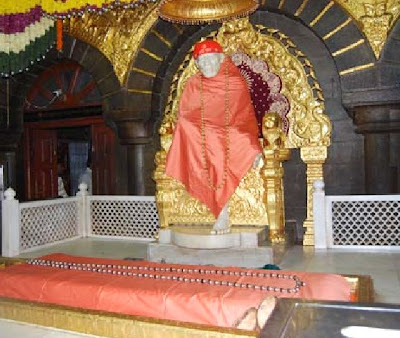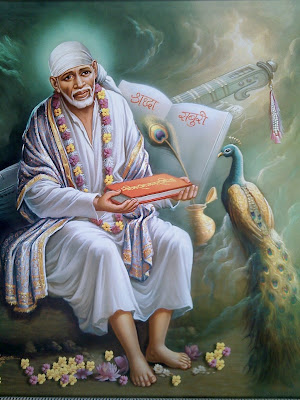
In Sai Baba Answers – Can We Talk To The Dead, Baba turns our attention to one of the deepest and most haunting questions seekers hold in their hearts. Many wonder if departed souls can truly respond to our calls, or if such moments are only subtle plays of our mind. Are these voices real messages from beyond, or reflections of our own yearning and imagination? Baba does not dismiss the mystery but instead guides us to look deeper into the nature of consciousness itself. His words invite us to pause, reflect, and step beyond fear or illusion. Through this gentle guidance, Baba opens a doorway into the timeless truths of life, death, and what lies beyond.
Can We Communicate with the Dead?
The old cemetery outside Shirdi was quiet, bathed in the soft glow of the evening lamps. The traveller walked slowly among the ancient tombstones, their inscriptions fading under the weight of time. A cool wind whispered through the trees, carrying echoes of voices long silenced.
A question troubled his heart.
Many had claimed to hear the voices of the departed, to see visions of those who had left this world. Some said the spirits of loved ones lingered, watching over the living. Others believed that the dead could send messages, through dreams, through signs, or through those gifted with the ability to speak to them.
Was this real? Or was it merely the mind’s longing for what was lost?
As he pondered, he noticed a familiar figure sitting on a raised stone near the boundary of the cemetery. Shirdi Sai Baba, wrapped in His simple white kafni, sat calmly, His gaze fixed on the horizon, as if listening to something beyond what human ears could hear.
The traveller approached and bowed.
“Baba,” he asked softly, “can the dead speak to us? Can we communicate with those who have left this world?”
Baba looked at him, eyes filled with quiet understanding. He gestured toward the tombstones.
“Tell Me, child,” he said, “if you call out to these stones, will they answer?”
The traveller hesitated.
“No, Baba, they are lifeless.”
Baba nodded.
“And if a man speaks to his shadow, will the shadow speak back?”
“No, Baba, it is only an illusion of movement.”
Baba smiled.
“Then why do you believe that the dead, whose bodies have returned to dust, can still use words?”
Does Consciousness Survive Death?
The traveller looked down, struggling with the weight of the question.
“But Baba, some people say they have seen their loved ones after death, heard their voices, felt their presence. Are they imagining it?”
Baba reached down and picked up a small clay lamp, its flame flickering against the wind.
“Look at this flame, child. If I place my hand before it, does my shadow flicker as well?”
The traveller nodded.
“Yes, Baba, the shadow moves with the flame.”
“And if I remove my hand, does the shadow remain?”
“No, Baba, it disappears.”
Baba gently cupped His hand around the flame.
“So too with life. The body is like this lamp, the flame is the mind, and the light it casts is what you call presence. When the lamp burns, the light spreads. And when the lamp goes out?”
The traveller swallowed hard.
“The light disappears, Baba.”
Baba nodded.
“But does that mean light itself no longer exists? Or does it simply return to where it always was?”
The traveller’s eyes widened.
“Then… consciousness does not die, Baba? It only dissolves?”
Baba’s smile deepened.
“Vedanta teaches that what you call ‘you’, this mind, this name, these memories, is like a wave upon the ocean. It rises, it falls, but the water remains. The Upanishads say, ‘The Self was never born and never dies.’ But tell me, child, when a wave dissolves, does it still remain a separate wave?”
The traveller’s heart pounded.
“No, Baba… it becomes the ocean again.”
“Yes,” Baba said gently. “The body perishes, the mind dissolves, but consciousness itself is neither born nor destroyed. It simply merges back into the vastness from which it came.”
Are We Truly Communicating with the Dead, or with Ourselves?
The traveller’s mind swirled with thoughts.
“But Baba,” he pressed, “what about those who see visions, who hear voices? Are they real?”
Baba looked toward the darkening sky, where a few stars had begun to appear.
“Child, when you dream, do you not see people, hear voices, feel as if you are somewhere else?”
“Yes, Baba, but those are dreams.”
“Ah,” Baba said, “but while you are in the dream, do you not believe it is real?”
The traveller exhaled sharply.
“Yes, Baba, I do.”
Baba picked up a handful of dry leaves from the ground and let them slip through his fingers.
“Grief is powerful, child. The mind, in longing, creates forms. It holds on to echoes of what once was, shaping them into dreams, into whispers, into visions. Some feel their loved ones watching over them, and some hear voices in the wind. But tell me, if a blind man dreams of seeing, does that mean his eyes are healed? Or was it simply his mind painting pictures in the dark?”
The traveller’s breath caught in his throat.
“Then, Baba, are you saying we do not communicate with the dead, but only with our own longing?”
Baba’s voice was soft but firm.
“The dead do not speak, child. It is the living who whisper to themselves, hoping to hear an answer.”
Vedantic & Sufi Wisdom: The Illusion of Separation
The wind rustled through the trees, carrying a deep stillness in its wake.
“Vedanta teaches that life and death are but two sides of the same dream. The body may fall away, but consciousness, pure and vast, remains. Yet, it is not ‘yours’ or ‘mine.’ The wave does not return as the same wave, but as the ocean itself.”
The traveller listened, his heart both heavy and light.
“And what do the Sufis say, Baba?”
Baba’s eyes twinkled.
“The Sufis say, ‘Die before you die.’ Do you know what this means?”
The traveller shook his head.
“It means, awaken while still alive. If you realize now that you were never the body, never the mind, then who is there to die? And if no one truly dies, then why long for communication? Is it not like one wave seeking another, when both have already returned to the sea?”
A Logical Example: The Radio Analogy
Baba picked up a small wooden flute lying beside him. He held it up.
“This flute, child, produces music. But tell me, is the music inside the flute?”
The traveller shook his head.
“No, Baba, the sound comes when the air moves through it.”
“Yes,” Baba said. “Now, if the flute breaks, does that mean music no longer exists?”
The traveller’s eyes widened.
“No, Baba, the music is still there, it just needs another flute to play it.”
Baba smiled.
“Then tell me, child, are you searching for the old flute, or for the music that never stopped?”
The traveller sat in stunned silence.
The Answer
Consciousness does not belong to any single body, it is part of the vast, infinite existence. When a person dies, their individual mind dissolves, just as a wave merges back into the ocean.
Those who claim to communicate with the dead may be hearing echoes of their own mind, not actual voices from beyond. Science shows that our minds create visions in grief, but Vedantic and Sufi wisdom teach that true connection is not through communication, but through realization, that no one ever truly leaves.
A Final Thought
If a man sees his father in a dream, is he truly there, or is he only in his mind?
And if life itself is a dream…
Who is truly alive, and who is truly gone?
Source: Sai Tatva E-Magazine Authored by Murali P K
Recently, we conducted a poll on the Sai Yug Network’s WhatsApp Channel asking which day you’d love to read Divine Talk articles and the response was overwhelming! Thursday emerged as the clear favorite.
So, dear reader, every Thursday, make sure to visit https://shirdisaibabastories.org/ for your weekly spiritual dose.
We would also love to hear your reviews, share your thoughts with us, so we may continue this beautiful exchange of wisdom and devotion.
Posts in this Series
1️⃣ Sai Baba Answers About Human Suffering
2️⃣ Why Is God Worshipped in Different Forms?
3️⃣ Existence and Reality – Sai Baba Answers
4️⃣ Why Does the Universe Seem Fine-Tuned for Life?
5️⃣ Is There Life Beyond Earth? Sai Baba Answers
6️⃣ Sai Baba on The Unseen Laws of the Universe
7️⃣ Sai Baba on Consciousness Beyond Science
8️⃣ Sai Baba Answers – Consciousness Beyond Death
9️⃣ Sai Baba Answers on Near Death Experiences
🔟 Sai Baba Answers on Spiritual Experiences and Parallel Worlds
1️⃣1️⃣ Sai Baba Answers – Can We Talk To The Dead
1️⃣2️⃣ Sai Baba Answers On Recurring Dreams



